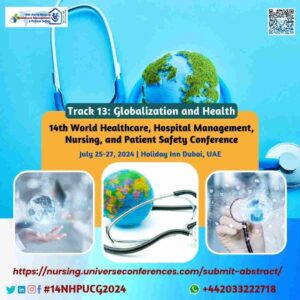
Track 13: Globalization and Health
Globalization
The term “globalization” refers to the process by which countries, peoples, and economies are linked and dependent on one another more and more. Through the dissemination of cutting-edge medical information, affordable medical technologies, and human rights, globalization has helped to enhance health. However, the neoliberal economic paradigm of liberalized trade, investment, and little government regulation has brought about a number of health problems. The health risks of neoliberal globalization are discussed in this article, starting with structural adjustment in the 1980s, moving through economic financialization in the 1990s and 2000s, and ending with the financial crisis and global recession of 2008, as well as the ensuing “austerity agenda” of state budget cuts. A consideration of high-level public measures that will guarantee that globalization works for “health for all” finishes the article.
Through the dissemination of cutting-edge medical information, affordable medical technologies, and human rights, globalization has helped to enhance health. Grab your slot for CME/CPD/CE accredited 13th World Nursing, Healthcare Management, and Patient Safety Conference on November 15-18, 2023 in Los Angeles, USA. Join the conference, and get a chance to meet other attendees and also learn about nursing, healthcare management, and patient safety.
Register Now: https://nursing.universeconferences.com/registration/
why it’s important of Globalization and Health
Globalization and health are interconnected in ways that have significant implications for individuals, communities, and nations worldwide. The importance of understanding this relationship lies in the multifaceted impact globalization has on health outcomes, healthcare systems, and public health. Here are key reasons why the intersection of globalization and health is important:
- Spread of Infectious Diseases:
- Globalization facilitates the rapid spread of infectious diseases across borders. Air travel, trade, and interconnected supply chains can contribute to the swift transmission of diseases, emphasizing the need for international collaboration in disease surveillance, prevention, and control.
- Access to Healthcare Resources:
- Globalization can improve access to healthcare resources, technologies, and knowledge. Collaboration between countries allows for the sharing of medical advancements, expertise, and best practices, contributing to enhanced healthcare delivery and outcomes.
- Health Inequalities and Disparities:
- Globalization can exacerbate health inequalities between nations and populations. Disparities in access to healthcare, medications, and technologies may widen, highlighting the need for global efforts to address health inequities and promote health for all.
- Health Workforce Mobility:
- Globalization leads to the migration of healthcare professionals across borders. While this can contribute to the global exchange of skills and knowledge, it also raises challenges related to workforce imbalances, brain drain from source countries, and ensuring adequate healthcare staffing.
- Medical Tourism:
- Globalization has given rise to medical tourism, where individuals seek medical treatment internationally. Understanding the implications of medical tourism is important for healthcare providers, policymakers, and patients, considering ethical concerns, quality standards, and potential impacts on local healthcare systems.
- Trade Agreements and Health Policies:
- Global trade agreements and policies can influence health outcomes. Negotiations involving intellectual property rights, drug pricing, and healthcare financing impact access to medications and medical technologies, necessitating consideration of public health priorities.
- Climate Change and Health:
- Globalization contributes to environmental changes, including climate change, with direct and indirect effects on health. Understanding the health implications of climate change, such as the spread of vector-borne diseases and the impact on vulnerable populations, is essential for global health planning.
In what ways does globalization affect health?
Since the migration of Homo erectus out of Africa a million years ago, humans have experienced constant transformation. In this sense, the development of human societies and globalization have gone hand in hand. 5 Our current stage of globalization, however, stands out due to the unparalleled level of intensity and change.
To say that globalization is either “good” or “bad” for health is oversimplified and untrue. For instance, global migration is increasing as a result of spatial change.
Richer nations are concerned about the possible financial costs of ill people migrating from the developing world. Less acknowledged are the risks that high-income nations may export to other regions of the world through fast food and tobacco goods, as well as more subtly through macroeconomic policies that influence foreign direct investment and debt loads. Additionally, there is a propensity to underestimate the advantages of population mobility for high-income nations. For example, the influx of medical personnel from understaffed high-income nations can help those nations’ underfunded health systems (but at the expense of capacity in the developing world). 7 In other words, when more people and things move about, each community experiences a complex equation of benefits and drawbacks.
What remedies do medical practitioners have?
These few examples allow us to make three basic inferences. First and foremost, it is critical for the health community to understand that globalization generally has both beneficial and negative effects on health. The precise balance between the two also depends on the people or population groupings in question. Depending on a person’s geographic location, sex, age, ethnic origin, degree of education, socioeconomic status, and other factors, some features of globalization may have widespread benefits or costs. The challenging task is to go through these diverse affects and comprehend how they are dispersed among various groups.
Universities of Globalization Health:
- University of London
- Brookings External
- CATO Institute External
- Center for Strategic and International Studies External
- Centre for the Study of Globalization and Regionalization External
- Economic Policy Institute: Trade and Globalization External
- National Bureau of Economic Research (NBER) External
- Peterson Institute for International Economics External
- RAND Corporation External
Organizations:
- Asian Development Bank External
- Bank of International Settlements External
- International Finance Corporation External
- International Migration Institute (IMI) External
- International Monetary Fund External
- Organization for Economic Co-operation and Development (OECD) External United Nations External
- The World Bank Group External
- World Economic Forum: Strategic Intelligence External

